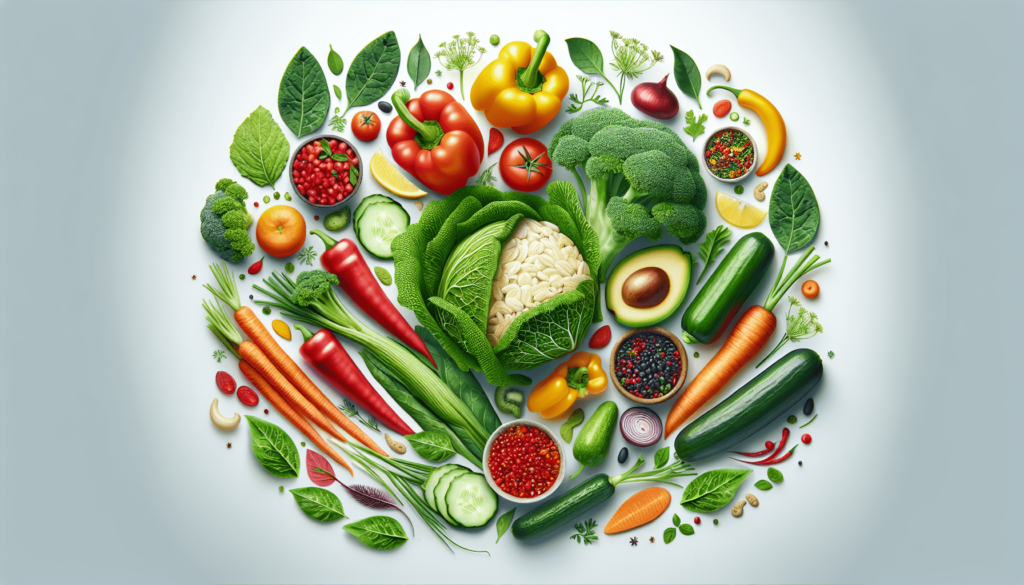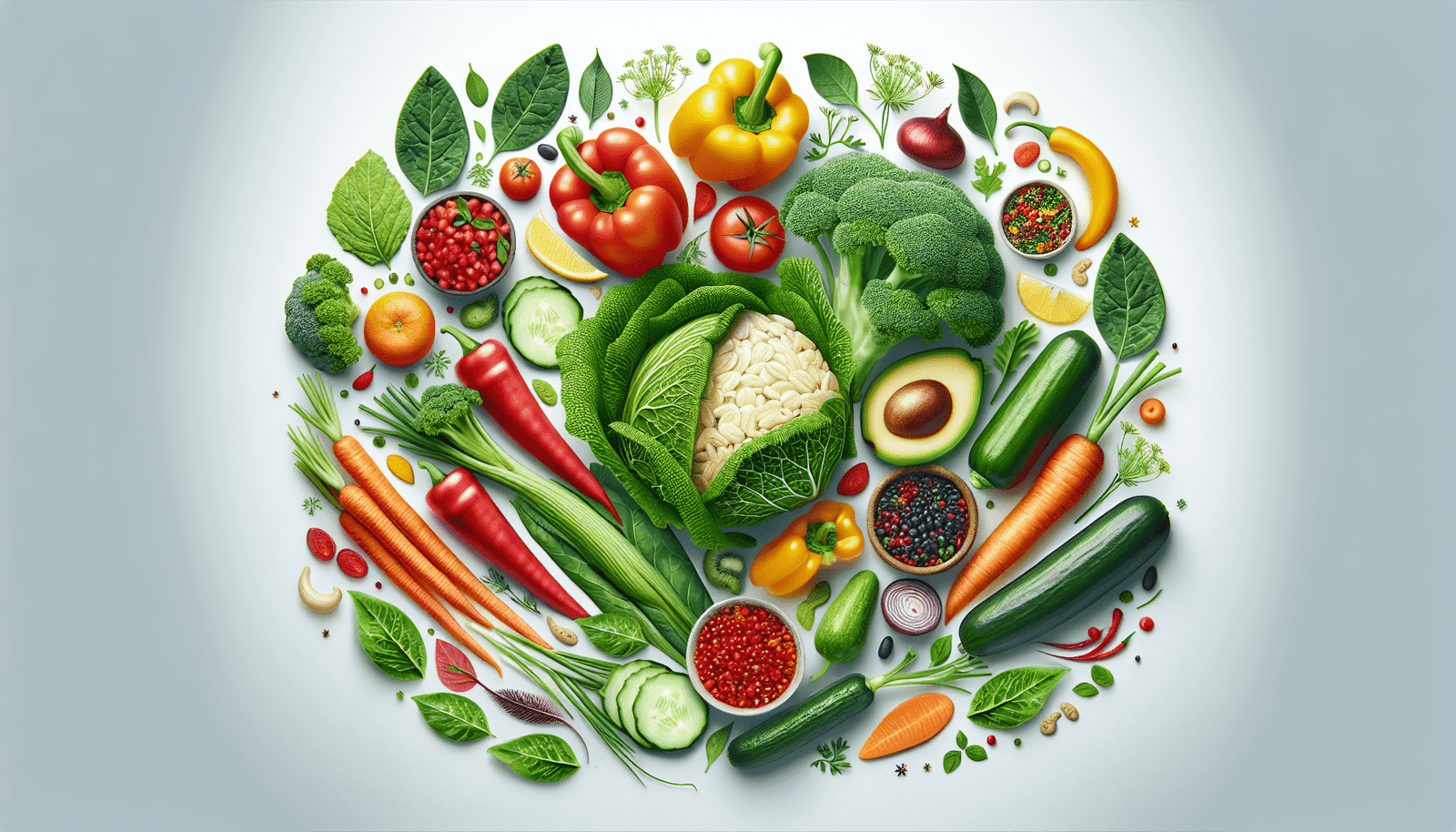If you’ve ever experienced the discomfort of digestive disorders, you know just how much it can disrupt your daily life. From bloating and constipation to acid reflux and Irritable Bowel Syndrome, these conditions can be frustrating to manage. However, there may be a simple solution lurking in your grocery store. Recent studies have suggested that certain vegetables could potentially help alleviate the symptoms of digestive disorders. So, before you reach for that over-the-counter medication, let’s take a closer look at how your favorite greens may hold the key to better digestive health.
Overview of Digestive Disorders
Digestive disorders refer to a wide range of conditions that affect the digestive system, including the esophagus, stomach, intestines, and other organs involved in the process of digestion. These disorders can cause a variety of uncomfortable symptoms and can significantly impact a person’s overall quality of life. It is essential to understand the definition, common symptoms, and prevalence of digestive disorders to better manage these conditions.
Definition of Digestive Disorders
Digestive disorders encompass a broad category of health conditions that affect the proper functioning of the digestive system. They can include disorders such as acid reflux, irritable bowel syndrome (IBS), inflammatory bowel disease (IBD), gastritis, and many others. These disorders can occur due to various factors, including genetics, lifestyle habits, diet, and certain medical conditions. Understanding the specific disorder and its impact on the digestive system is crucial for effective management.
Common Symptoms of Digestive Disorders
Digestive disorders can manifest in different ways, but some common symptoms are often experienced by individuals with these conditions. These symptoms may include abdominal pain, bloating, gas, diarrhea, constipation, nausea, vomiting, acid reflux, and changes in bowel movements. It is important to note that the severity and frequency of these symptoms can vary depending on the specific disorder and individual factors. Recognizing these symptoms can help individuals seek appropriate medical attention and implement strategies to manage their digestive health effectively.
Prevalence of Digestive Disorders
Digestive disorders affect a significant portion of the population worldwide. They are prevalent conditions that can impact people of all ages and backgrounds. According to the American Gastroenterological Association, around 60 to 70 million Americans are affected by digestive disorders, making it a common health concern. The World Gastroenterology Organization estimates that approximately one-quarter of the global population suffers from functional gastrointestinal disorders. These statistics highlight the importance of addressing digestive disorders and finding effective ways to manage and alleviate their symptoms.
Role of Vegetables in Digestive Health
When it comes to maintaining and improving digestive health, incorporating a variety of vegetables into your diet can be highly beneficial. Vegetables are packed with essential nutrients, fiber, and vitamins that support the proper functioning of the digestive system.
Nutritional Benefits of Vegetables
Vegetables are known for their high nutritional content. They are excellent sources of essential vitamins and minerals that promote overall health and well-being. Some key nutrients found in vegetables include vitamins A, C, E, and K, as well as minerals like potassium, magnesium, and folate. These nutrients play vital roles in various bodily functions, including digestion, nutrient absorption, and immune system function. By consuming a diverse range of vegetables, you can ensure that your body receives the necessary nutrients for optimal digestive health.
Fiber in Vegetables for Digestive Health
One of the most important aspects of vegetables for digestive health is their high fiber content. Fiber is a type of carbohydrate that the body cannot digest fully. It passes through the digestive system, adding bulk to the stool and aiding in regular bowel movements. By including fiber-rich vegetables in your diet, such as broccoli, spinach, and cabbage, you can promote healthy digestion and prevent issues like constipation. Fiber also helps maintain a healthy balance of gut bacteria, which is crucial for overall digestive health.
Vitamins and Minerals in Vegetables
Vegetables are abundant in various vitamins and minerals that directly contribute to digestive health. For example, vitamin A promotes the health of the tissues lining the digestive tract, while vitamin C supports the immune system, reducing the risk of infections in the digestive system. Additionally, minerals like potassium and magnesium help maintain proper muscle function in the digestive tract, aiding in smooth digestion. By regularly consuming a variety of vegetables, you can ensure an adequate intake of these essential nutrients, supporting optimal digestive health.

Specific Vegetables for Digestive Disorders
While all vegetables contribute to digestive health, certain vegetables offer unique benefits for managing specific digestive disorders. Incorporating these vegetables into your diet can help alleviate symptoms and support the overall well-being of your digestive system.
Broccoli
Broccoli, a member of the cruciferous vegetable family, is known for its numerous health benefits. It is rich in fiber, vitamins, and minerals that are essential for digestive health.
Health Benefits of Broccoli
Broccoli is a nutritional powerhouse, boasting an impressive array of vitamins and minerals. It is an excellent source of vitamin C, vitamin K, and folate. These nutrients contribute to the overall health of the digestive system by supporting the immune system, aiding in the absorption of nutrients, and promoting healthy bowel movements.
Broccoli’s Effect on Digestive Disorders
Broccoli has been found to have anti-inflammatory properties, which can be beneficial for individuals with digestive disorders characterized by inflammation, such as Crohn’s disease or ulcerative colitis. The high fiber content in broccoli also helps prevent constipation and promotes regular bowel movements, making it beneficial for those suffering from conditions like IBS.
Recommended Consumption of Broccoli
To reap the digestive benefits of broccoli, aim to include it in your diet regularly. You can enjoy it steamed, roasted, sautéed, or added to soups and stir-fries. Experts recommend consuming at least 2 cups of broccoli per week to support overall digestive health.
Spinach
Spinach is another vegetable that offers significant benefits for digestive health. It is a leafy green vegetable packed with essential nutrients.
Nutritional Value of Spinach
Spinach is an excellent source of fiber, vitamins A and C, iron, and magnesium. These nutrients contribute to digestive health and support various bodily functions.
Impact of Spinach on Digestive Health
The fiber content in spinach promotes regular bowel movements and helps prevent constipation. The high vitamin A content supports the health of the digestive tract’s epithelial cells, while vitamin C boosts the immune system, reducing the risk of infections. By regularly incorporating spinach into your diet, you can support optimal digestive health.
Incorporating Spinach into the Diet
Spinach can be easily incorporated into your daily meals. It can be enjoyed raw in salads, added to smoothies, or cooked in stir-fries, soups, and casseroles. Aim to include spinach in your diet several times a week to maximize its benefits for digestive health.
Cabbage
Cabbage is a versatile vegetable that offers numerous digestive benefits. It is rich in nutrients and compounds that can support a healthy digestive system.
Cabbage’s Digestive Benefits
Cabbage contains fiber, vitamin C, and certain phytochemicals that promote good digestive health. The fiber helps promote regular bowel movements and prevent constipation. Vitamin C supports the immune system’s function in the digestive tract, reducing the risk of infections. Additionally, cabbage contains compounds such as glutamine and glucosinolates, which have been found to have anti-inflammatory properties.
Types of Cabbage and Their Effects
There are different types of cabbage, including green cabbage, red cabbage, and savoy cabbage, each with its unique flavor and nutrient profile. Green cabbage is the most common variety, while red cabbage contains additional antioxidants. Savoy cabbage has tender leaves and a milder flavor. All types of cabbage provide similar digestive benefits, so incorporating any variety into your meals can be beneficial.
Recipes to Include Cabbage in Meals
Cabbage can be a versatile and tasty addition to various dishes. It can be consumed raw in salads, fermented to create sauerkraut, or cooked in stir-fries, soups, or stews. Cabbage rolls and cabbage soups are also popular dishes that make excellent use of this nutritious vegetable. Experiment with different recipes to find delicious ways to incorporate cabbage into your meals and enjoy its digestive benefits.
Carrots
Carrots are not only known for their vibrant color and sweet taste but also for their numerous health benefits, particularly for improving digestive health.
Benefits of Carrots for Digestion
Carrots are rich in fiber, which helps promote regular bowel movements and prevent constipation. They are also a good source of antioxidants, including beta-carotene, which can support a healthy digestive system. Additionally, carrots contain specific enzymes that assist in breaking down certain compounds, aiding in proper digestion.
Carrots as a Source of Fiber
Fiber is an essential component of a healthy diet, and carrots provide a significant amount of this important nutrient. By including carrots in your meals or as a snack, you can increase your fiber intake, supporting digestive regularity and overall gut health.
Ways to Incorporate Carrots into Meals
Carrots can be enjoyed in various ways, whether raw, cooked, or juiced. Raw carrots make a nutritious and convenient snack, while cooked carrots can be added to stir-fries, soups, or roasted vegetable dishes. Juicing carrots can be an excellent way to obtain their nutritional benefits in a refreshing beverage. Aim to include carrots in your meals regularly to support digestive health.
Sweet Potatoes
Sweet potatoes are a nutritious root vegetable that not only adds flavor to meals but also contributes to digestive health.
Digestive Benefits of Sweet Potatoes
Sweet potatoes are an excellent source of dietary fiber, which aids in promoting regular bowel movements and preventing constipation. The high fiber content can also help maintain a healthy balance of gut bacteria, supporting optimal digestion. In addition, sweet potatoes are rich in antioxidants, such as beta-carotene, which can help reduce inflammation in the digestive tract.
Sweet Potatoes as a Source of Antioxidants
Antioxidants are crucial for combating oxidative stress in the body, including the digestive system. Sweet potatoes, particularly the orange-fleshed varieties, are packed with antioxidants that support overall digestive health and protect against cellular damage.
Cooking Methods for Sweet Potatoes
Sweet potatoes can be cooked in various ways to suit different tastes and preferences. They can be baked, roasted, boiled, or mashed. Sweet potato fries and chips are also popular options. Experiment with different cooking methods to find your favorite way to enjoy the digestive benefits of sweet potatoes.
Peppermint
Peppermint is an herb that is widely known for its soothing and refreshing properties. It has been used for centuries to alleviate digestive discomfort and promote overall digestive health.
Effects of Peppermint on Digestion
Peppermint has been found to have muscle-relaxing properties. This can be particularly helpful for individuals with digestive disorders characterized by spasms or muscle contractions, such as irritable bowel syndrome (IBS). Peppermint can help relax the muscles in the gastrointestinal tract, reducing pain and discomfort.
Uses of Peppermint for Digestive Disorders
Peppermint is commonly consumed as a tea or taken in the form of enteric-coated capsules, which ensure that the peppermint oil is released in the intestines rather than the stomach. These forms of peppermint can help alleviate symptoms such as abdominal pain, bloating, and gas associated with digestive disorders. However, it is important to note that peppermint may not be suitable for everyone, and it is advisable to consult a healthcare professional before using peppermint for digestive issues.
Precautions When Using Peppermint
While peppermint can provide relief for some individuals with digestive disorders, it is essential to exercise caution. Peppermint may interact with certain medications and can cause side effects such as heartburn or allergic reactions in some people. If you are pregnant, breastfeeding, or have specific medical conditions, it is best to consult with a healthcare professional before using peppermint.
Conclusion
Incorporating a variety of vegetables into your diet can have a profound impact on digestive health. From broccoli and spinach to cabbage, carrots, sweet potatoes, and peppermint, these vegetables offer unique benefits that can alleviate symptoms of digestive disorders and promote overall well-being. By consuming a balanced diet rich in vegetables, you provide your body with essential nutrients, fiber, and antioxidants that support optimal digestive function. However, it is important to remember that individual needs may vary, and consulting a healthcare professional is always recommended for personalized advice on managing digestive disorders. So, embrace the power of vegetables and take a step toward a healthier digestive system today!


